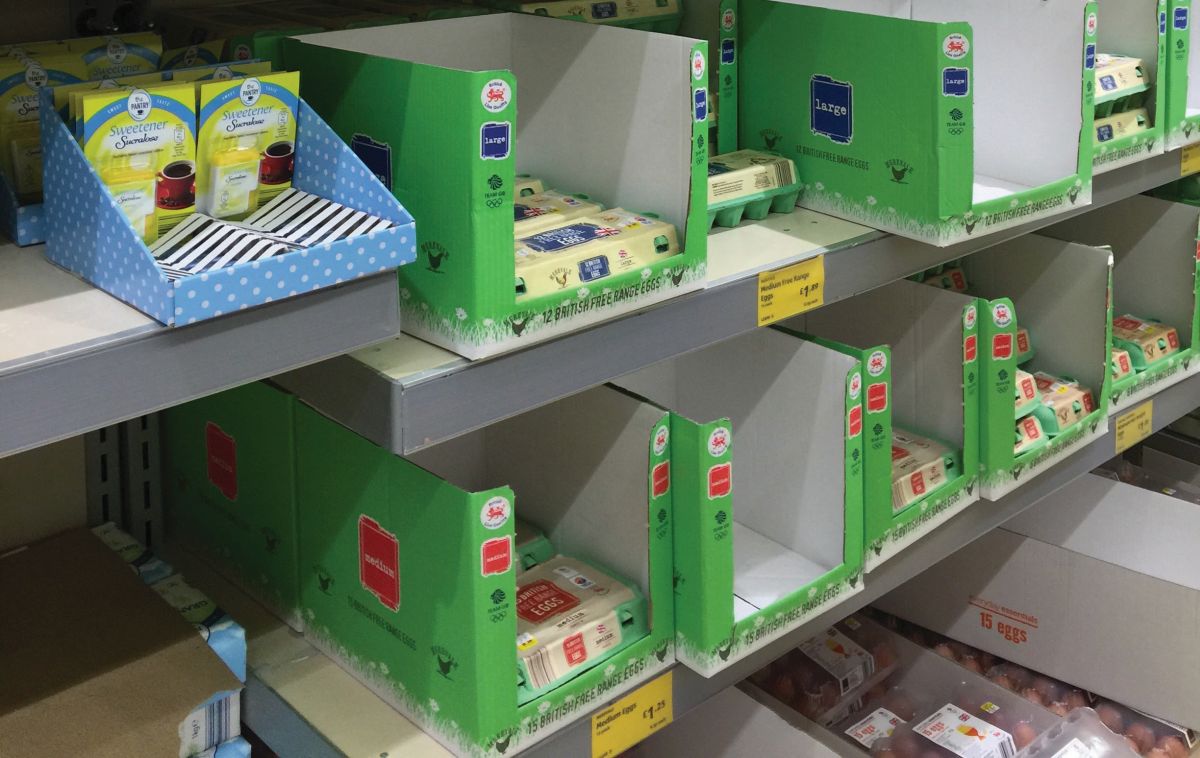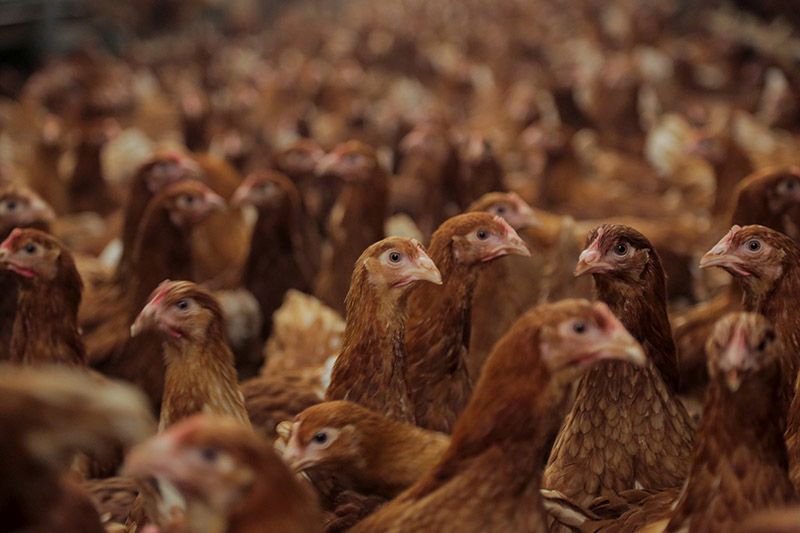Free range eggs set to disappear from supermarket shelves around Europe

Free range eggs could be completely wiped from supermarket shelves if the Government's current housing order is extended beyond the end of February.
The Department for Environment, Food and Rural Affairs (Defra) ordered all free range poultry locked up in an attempt to curtail the spread of highly pathogenic H5N8 avian influenza, which has hit 18 European countries, including the United Kingdom, where four cases of the virus have been confirmed so far.
Under European Union rules, free range birds can only be housed for a maximum of 12 weeks without losing their free range status.
Those 12 weeks will be up in the UK at the end of February. If the housing order is extended beyond that point the whole of the UK's free range flock will be downgraded to barn, causing a financial crisis for free range producers and leaving retailers with no supply of free range eggs.
It comes at a time when free range eggs are more popular than ever with consumers.
'Must not be allowed to happen'
Mark Williams, chief executive of the British Egg Industry Council (BEIC) has said that the loss of free range status must not be allowed to happen.

He is pressing both the UK Government and the European Union for action. FarmingUK has been told that farmers' representatives in other EU countries are also lobbying politicians.
Mark Williams said: “Whilst we would be guided by veterinary advice, in the face of potentially losing free range egg marketing status - which we cannot allow to happen - we believe that the AIPZ (avian influenza protection zone) must be lifted on February 28 across Great Britain, but with the maintenance of high levels of enhanced bio-security.”
It was the AIPZ order that included the instruction to house poultry. He said, “We are working with Defra to determine what this would be in high risk areas.”
At European level, he said, egg industry leaders wanted a temporary extension to the time that birds could be housed without losing their status.
“This would remain in place until such time as veterinary authorities determine that the disease situation allows for any housing restriction to be lifted - possibly in a further one to two months,” said Mr Williams.
“It is our view that we are in exceptional circumstances across the EU and this calls for exceptional measures to be put in place. The simple solution is for the EU Commission to allow the 12 weeks to be extended for a further one to two months to get past this time of heightened disease challenge.”
761 outbreaks of H5N8
Between October and January there were a total of 761 outbreaks of H5N8 in Europe - 51 per cent in poultry and the rest in wild birds.
Some 1.6 million poultry were destroyed. As well as affecting 18 countries in Europe, H5N8 has also been found in Asia, Africa and the Middle East.

Based on figures produced by free range egg magazine The Ranger, losses for the UK free range egg industry could run into millions of pounds if its eggs have to be downgraded.
Ranger costings show that producers are already losing as much as £4.08 per bird on an average egg price of 88 pence per dozen.
If the eggs had to be sold as barn and the price was consequently cut to 70 pence per dozen, the loss per bird would be £8.58. On a national free range flock of 18 million birds, the additional loss to the free range egg sector could amount to as much as £81 million.
'Extremely worried'
Robert Gooch, chief executive of the British Free Range Egg Producers Association (BFREPA), said the association's members were extremely worried about the prospect of birds losing their free range status.
“The cost to free range producers of having their eggs downgraded to barn doesn't bear thinking about,” he said.
“There will need to be many discussions over the next few weeks. I know how busy Defra will be but we will need to have an answer before the end of February.”
Supermarkets are clearly aware of the looming crisis. Individual retailers did not want to comment at the moment, although they made it clear that they were in discussions with the BEIC, the British Poultry Council, the National Farmers Union and Defra. The British Retail Consortium (BRC), which represents the British retail industry, is also involved in talks.
A BRC spokesman told FarmingUK: “As producers are required by law to bring the birds indoors to prevent the spread of the virus, the free range status of eggs is maintained and they will be marketed and labelled as free range.
“We are working with Defra to find a pragmatic solution that mitigates any negative impact on free range farmers should the enforced housing period extend beyond the 28 February, when the derogation from free range regulation ends.”
'Protecting against avian flu a priority'
Defra was non-committal when FarmingUK approached it for a comment. A spokesman said: “There is no impact on the free range status of birds or eggs as result of the prevention zone currently in place across the UK.
“Protecting against the threat of avian flu is a priority and it is essential all bird keepers maintain high bio-security standards.
“Appropriate measures have been put in place to reduce the risk of domestic birds becoming infected and they are kept under review following the best scientific evidence.”
FarmingUK pressed Defra on whether it was possible that the Government could ask the EU to extend the 12-week period to enable producers to maintain their free range status.
The spokesman simply said: “We are keeping all measures under review and following the best scientific evidence.”
Housing order
The housing order was put in place across the United Kingdom on December 6 - before any AI cases had been found in the UK.
Defra took the measure to try to prevent H5N8 carried by migratory birds infecting commercial flocks in this country.
When cases were subsequently discovered here, Defra extended the housing order until the end of February, although the decision to introduce such a long extension came as a surprise to many in the industry.
Robert Gooch said: “We had been asking for a 14-day or 30-day extension so that we had some leeway before we had birds losing their free range status,” he said.
An extension until the end of February had not been officially discussed with anyone else, as far as he knew.
'Swift action'
The most recent case of H5N8 in the UK was confirmed on a turkey farm in Lincolnshire on January 16. The same strain of the virus was found on another turkey unit nearby in December.
The virus has also been found on backyard flocks in Wales and North Yorkshire, in a swannery in Dorset and in a number of other wild birds across the country.
Following the latest outbreak, chief veterinary Officer Nigel Gibbens said: “We have taken swift action to limit the risk of the disease spreading, with restrictions in place around the affected premises. A full investigation is underway to determine the source of the infection.
“This finding reminds us that we must all be vigilant for signs of disease and take steps to minimise the risk of birds catching the disease from wild birds – either directly or through the environment.
“This means complying with the legal requirement currently in place to house birds or otherwise keep them separate from wild birds and following strict bio-security measures to minimise the risk of avian flu spreading via the environment."
Defra has warned that everyone must comply with the order, after concerns were raised that some owners of backyard flocks may not be following instructions as strictly as commercial poultry farmers.
Mark Williams says that breaking the rules could be an offence under the 1981 Animal Health Act. Anyone breaking the order could face a fine and/or imprisonment.








